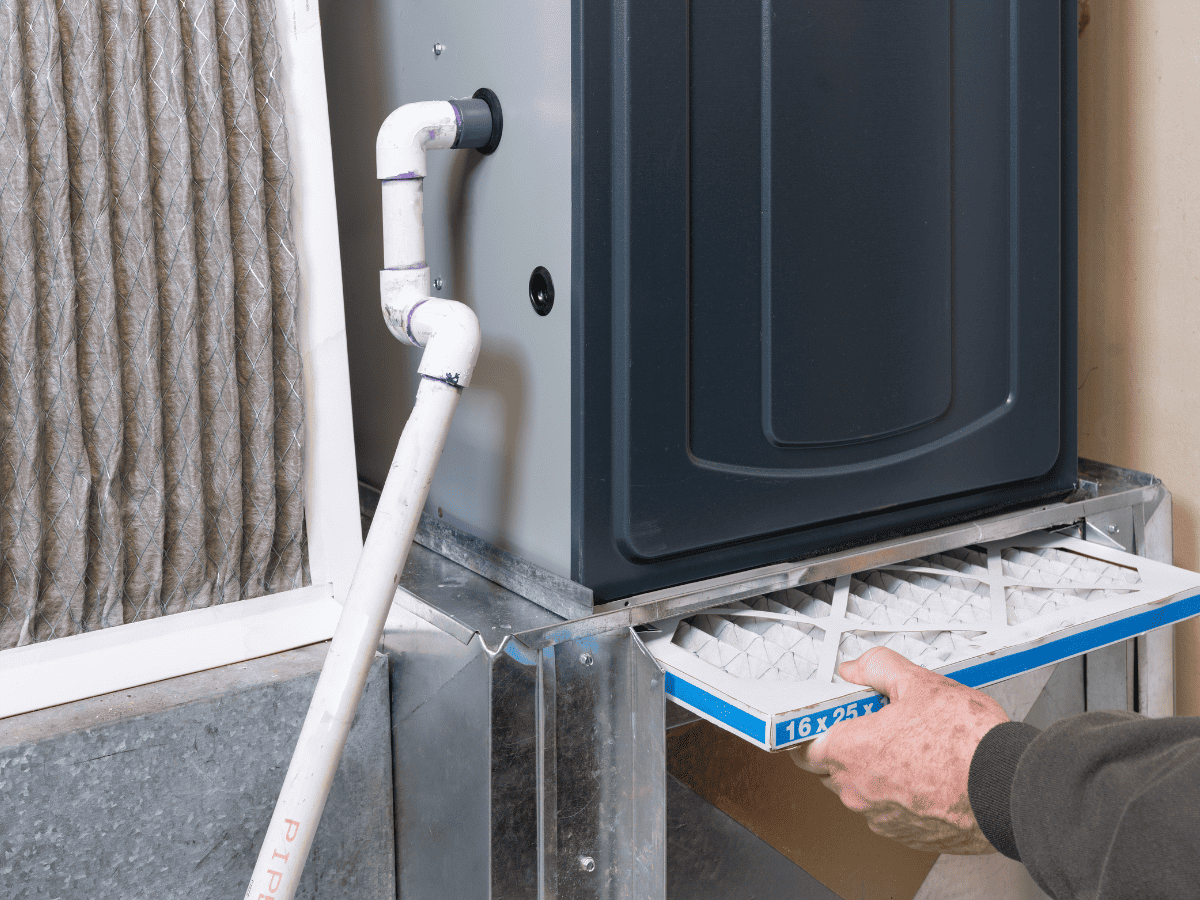When the chill of the Arizona nights starts seeping into your home, the number one thing you want is a reliable heating system.
However, a good heater isn’t only measured by the comfort it provides, consider its cost-efficiency as well. Many homeowners don’t realize that clinging to an outdated heating system is like tossing dollar bills into the evening sky – it can be a costly endeavor.
By understanding your options, you can avoid the financial pitfall of an inefficient system and ensure you’re getting the most value for each degree of warmth. Customers ask us all the time how to choose the best heating system. Here’s a comparison of gas and electric furnaces, two of the main competitors on the market today.
Gas furnace
A gas furnace, as the name suggests, is powered by natural gas. The fuel is ignited in the combustion chamber and heats the air, which gets pushed throughout your house. When you adjust the temperature, your thermostat ensures the system provides consistent comfort, no matter how chilly it gets outside.
Gas furnace pros
- Cost-Efficient: Gas furnaces often have lower fuel prices than electric ones, particularly in regions where natural gas is abundantly available and thus cheaper. Also, gas systems use very little electricity so your home energy costs are lower.
- Faster Heating: The combustion process in a gas furnace delivers heat faster than electric coils, quickly bringing comfort on chillier brisk nights.
- Economic Long-Term Choice: With proper maintenance, gas furnaces can have a longer life expectancy, meaning more years of reliable warmth for your family.
- Environmental Consideration: Natural gas burns cleaner than coal used for electricity production, reducing your heating solution’s carbon footprint.
Gas furnace cons
- Installation Complexity: These units have a lot of components so they require the help of a professional. When it comes to gas lines and proper venting, safety isn’t a DIY matter!
- Higher Initial Cost: The initial investment can be steeper than electric options. It’s like paying a little more for a premium seat — it costs more but offers better comfort.
- Regular Service Required: Gas furnaces require regular care to operate efficiently and safely, including inspections for gas leaks or ventilation issues.
- Risk of Gas Leaks: Though rare, natural gas presents a risk of leaks. Lack of maintenance can lead to carbon monoxide leaks; thus, carbon monoxide detectors are essential.
- Not as Eco-Friendly as Renewable Options: While natural gas is cleaner than coal, it’s still a fossil fuel. For those aiming for a smaller carbon footprint, renewable heating systems might be a better fit.
Electric furnace
Electric furnaces are simpler, requiring only an electrical outlet to keep you warm. These systems use electric heating elements to warm the air, which is then circulated throughout your home. It is generally easier to install and maintain, making it a popular choice for those who don’t have natural gas lines or prefer a simpler, straightforward heating solution.
Electric furnace pros
- Lower Installation Costs: Electric furnaces are typically less expensive and faster to install without the need for gas lines or venting infrastructures.
- Safety and Maintenance: Electric furnaces pose no risk of gas leaks or carbon monoxide poisoning and require less maintenance than their gas counterparts.
- Longevity: They often last longer than gas furnaces due to having fewer moving parts and experiencing less wear over time.
- Environmentally Friendly: When paired with renewable energy sources, such as solar panels, electric furnaces can be a clean heating option.
- Consistent Energy Prices: Electricity prices tend to be more stable than gas, providing a predictable cost for heating throughout the year.
Electric furnace cons
- Slower Heating: Electric furnaces may take longer to heat a space compared to gas furnaces, potentially leading to slight discomfort during the coldest times.
- Higher Operating Costs: While they may be cheaper to install, electric furnaces use a lot of electricity. They are more expensive to operate in areas where electricity rates are high.
- Dependence on Electricity: In the event of a power outage, homes with electric furnaces will be left without heat, which can be problematic in severe weather conditions.
- Less Efficient in Cold Climates: Electric furnaces are often less efficient in very cold environments, as they require more energy to maintain warmth than gas furnaces.
- Carbon Footprint: If the electricity is sourced from fossil fuels, using an electric furnace can contribute significantly to your home’s carbon footprint, counteracting its environmentally friendly potential.
5 Main factors to consider
Here are five things to consider when choosing any HVAC system.
Factor #1 – Upfront installation costs
Home appliances often require professional tools and assistance to install – we would warn customers never to attempt a DIY installation. This is a safety hazard and can affect the warranty.
The simplicity of electric furnace installation means lower initial fees. On the flip side, gas furnace installation is a more intricate procedure, requiring more components to manage gas lines and ventilation systems safely. These additions to the process affect the installation location and cost of labor.
Factor #2 – Utility costs (Is it cheaper to heat with gas or electric?)
Electric furnaces boast nearly 100% efficiency in energy conversion as they convert all consumed energy into heat. Despite this, their heating capacity often falls short compared to gas furnaces due to design differences. Gas furnaces have an inherent heating advantage with their combustion process compensating for energy lost via exhaust gasses.
Consider the price of natural gas vs. electricity in your area. If cost is a major problem and you need an inexpensive option, this might ultimately be the deciding factor.
Factor #3 – Maintenance and working lifespan
Consider the different demands each system places on your home’s upkeep routine. Gas furnaces typically have a longer lifespan, ranging from 15 to 20 years, but they require annual inspections to ensure safe operation due to the potential hazards of gas leaks and combustion byproducts.
Electric furnaces have a shorter lifespan of 10 to 15 years but have fewer safety concerns, leading to simpler and often less expensive maintenance routines.
However, for Arizona homeowners, the reduced need for heating may prolong the life of either system, making the maintenance concern secondary to the sheer functionality and effectiveness of the system in combating the region’s unique climate.
Factor #4 – Climate considerations
Consider how powerful of a heating system you need living in Bullhead City, Arizona. Our region is renowned for the sweltering heat in the summer, while winters are fairly mild. Unless you need extra heating during the colder months of the year, you may not need as robust a system as a northerner.
Ask a professional technician like the ones at River Valley for expert advice tailored to your specific needs and lifestyle.
Factor #5 – Rebates and incentives
Ask a professional if there are any rebate programs available for installing a new system. This can save you a lot of money on the installation, and may even save you on running costs. Hence, when money is a factor, it’s worth noting any government incentives.
Which furnace should I choose? Call our team.
When contemplating a home renovation project in Arizona, trust the experts at River Valley to guide you through your decision-making process. Whether you prioritize upfront installation costs, utility savings, low maintenance, or climate considerations, our knowledgeable team is here to help.
Contact our team to learn more about what options will best fit your needs. With the right information and a trusted partner in River Valley, you can make a decision with confidence and peace of mind.

